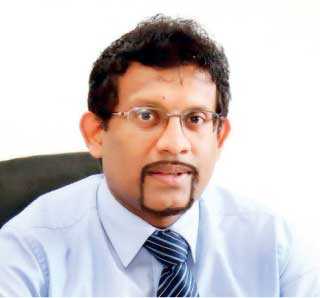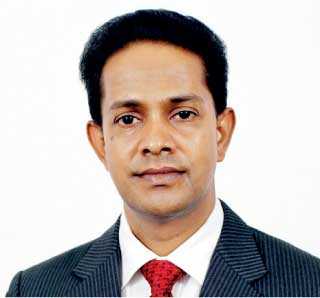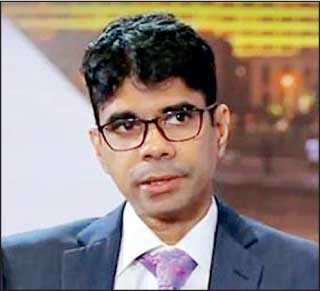Tuesday Feb 17, 2026
Tuesday Feb 17, 2026
Monday, 13 July 2020 00:13 - - {{hitsCtrl.values.hits}}
 |
| Ministry of Power and Energy Director - Development Sulakshana Jayawardena |
 |
| Public Utilities Commission Director General Damitha Kumarasinghe |
 |
| Energy Expert Dr. Vidhura Ralapanawe |
 |
| Moderator INSSSL Director - Communications and Publications Rear Admiral Dimuthu Gunawardena
|
Energy security is a vital component of national security as access to cheap energy has become essential to the functioning of modern economies. It is a complex term with its implications in a wide range of spheres: political, economic, environmental, social, technical, etc. And due to the uneven distribution of energy supplies among countries, it has led to significant vulnerabilities creating socio-economic and environmental consequences.
To ensure access to energy for quality of life and economic development, we need to consider the energy security policies for sustainable development in Sri Lanka. Both fossil fuel and renewable energy are being used for different purposes in Sri Lanka. Burning fossil fuels creates carbon dioxide gas, which harms the environment and making the earth warmer day by day. Once fossil fuels are used up they cannot be replaced, so the trend today is to use sources of renewable energy.
The premier thinks tank on national security, Institute of National Security Studies Sri Lanka (INSSSL), conducted a webinar on ‘Energy Security for Sustainable Development in Sri Lanka’ with a platform sponsored by MAC holdings. The webinar was held on 29 June from 3 p.m. to 4:30 p.m. via Zoom and the speakers consisted of Ministry of Power and Energy Director (Development) Sulakshana Jayawardane, Damitha Kumarasinghe, Director General, Public Utility Commission of Sri Lanka, and Dr. Vidura Ralapanawa (Expert on Energy). The webinar was moderated by Rear Admiral Dimuthu Gunawardena, Director (Communications and Publications), and INSSSL.
Rear Admiral Dimuthu Gunawardena in his preamble stated, “Energy security is defined as reliable supply of energy and access to energy resources and fuel in the required quantity and quality at reasonable prices. The importance of energy security is also growing because of vast shrinking oil reserves and advancing climate changes which create increasingly powerful pressure on the reorientation of energy from fossil fuels to other types of renewable energy sources such as solar, wind, bio, geothermal and hydro.”
He also emphasised that the production of energy is the largest source of air pollution in the world. By choosing smart energy as the electricity provider, we will be able to help the planet without hurting our budget.
According to him, the COVID-19 has had a game-changing effect in accelerating the clean energy transition in the power sector. Government, businesses, and households kept the lights on during the pandemic, but with cheaper and greener energy.
Rear Admiral Dimuthu Gunawardena then invited the first panellist, Sulakshana Jayawardane to address the audience.
Sulakshana initially gave an overview of Sri Lanka’s installed capacity, the demand, and the generation cost and said that the deficit of generation cost with the selling price was Rs. 6.70 which is the current issue. He emphasised that bringing down the generation cost or increasing the tariffs further are the two solutions and further stated that bringing the generation cost down is a more viable option with the introduction of low cost generation sources to the system.
He also differentiated the two perspectives of energy security which is uninterrupted availability of energy systems with affordable prices and on customer point of view it is the reliability of supply of power. He also mentioned that poor power qualities can cause damages to the manufacturing process especially of food industry and also the health industry. As an example he cited that during the COVID period the CEB ensured an uninterrupted power supply rising up to the need of the country.
On the other hand, he pointed out that Energy security is vital for the communication sector as well. He also emphasised that the Ministry of Power and Energy introduced National Energy Policy in 2019 and the present President has declared in his manifesto that 80% of energy should be from the renewable sources by 2030, as stated in the National Renewable energy policy. He was confident in achieving this target amidst various challenges ahead.
Then Damitha Kumarasinghe continued the discussion on the economic aspect of energy security by initially differentiating ‘energy security’ as per the definition of IEA and ‘security of energy’ stating that they should not be considered as same. He stated that the Energy security is basically the different aspects of the source of energy while Security of energy is a measure of resilience of the system from unexpected happenings.
He then elaborated on the point as to how the insecurity of energy will impact the economy citing examples and stated that at the planning stage one must address all issues of the economy of energy security and security of energy.
Dr. Vidura Ralapanawa then made his presentation giving a strong message showing how the climatic changes could be one of the biggest challenge to national security in the future and a reason why renewable energy should play a bigger role in the energy equation.
He explained Sri Lanka’s past position on renewable energy was not satisfactory comparing with other countries in the world but said that while working on the new President’s manifesto of having 80% renewable energy that the situation will improve in the future. He elaborated that banks in the world that were funding for supply of coal mines have now declined and that it is gradually happening to other supplies of fossil fuels as well and hence reliance of such supply chains will lead to shocks in the future.
He also mentioned that when large consumers stop buying fossil fuels the market drops and closes down as there is no demand. Sighting that too much of concentration of energy sources in one location such as Norichcholai may put the whole country in to darkness in an eventuality he stated that renewable energy will overcome such issues.
He also mentioned that Sri Lanka has a very high wind potential and solar potential and that if Sri Lanka is committed on renewable energy that we could have much over 100% energy that we would need through renewable energy by 2040 with resilience to all types of consumers against large scale failure.
The discussion ended with a Q and A session which gave more opportunities for the panel to deliberate on challenges faced at present, adaption of renewable energy and environmental impacts.